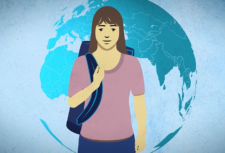Disclaimer: This article is more than 12 years old, and may not include the most up-to-date information or statistics. Please verify information with more recent sources as needed, and if you have any questions contact our Press Office.
1 June 2011
The British government must stop dragging its feet and fully support a new international convention to protect domestic workers from abuse and slavery, says a coalition of charities and Trade Unions including Anti-Slavery International and Christian Aid.
Representatives from national governments are meeting in Geneva from 1 June to discus at the annual International Labour Organization (ILO) conference details of a new Domestic Worker Convention. The final vote on whether to create the convention is due to take place on 15 June.
In the UK it is estimated that one in 10 households already employ some form of domestic help and each year around 15,000 domestic workers visas are granted to migrants entering in the UK.
Unfortunately, abuse of migrant domestic workers in the UK is common place and research by Justice for Domestic Workers found 95 per cent of its 111 members were not paid the minimum wage; 57 per cent were expected to work more than 55 hours a week; 48 per cent workers did not have written contracts; 41 per cent had no paid holiday in a year; 70 per cent did not receive sick pay; 73 per cent experience work stress symptoms including headaches, insomnia and anxiety.
As well as covering full time live-in domestic workers, the new convention will also protect ‘cleaners’ who will be now be formally recognised as part-time domestic workers. Individual employers will be expected to pay minimum wage and National Insurance. ‘Nannies’ employed to also perform other domestic duties, such as cooking or cleaning, will also fall under the protection of the new convention.
The UK has currently been unwillingly to sign up to any new convention that would result in the need to amend current laws. Many national governments have expressed concerns over interfering in arrangements within private homes.
However, the rights of workers, including those relating to working hours and minimum wage must be extended to all areas of work, including where applicable employer’s homes, in order to prevent abuses that can quickly lead to forced labour or servitude, crimes now punishable in the UK with up to 14 years in prison.
The British government has also expressed doubts over the feasibility of regulating or monitoring an industry that takes place behind closed doors. Despite this, several countries across the world, including Ireland and South Africa, have introduced creative methods for inspection are already successfully ensuring potential abuse is being spotted. Also, the British government does not need to monitor domestic work by inspecting every home but should at the very least sign up to a principle of inspecting any home implicated in a complaint.
Audrey Guichon, Anti-Slavery International’s Domestic Work Coordinator, said: “By not fully backing the need to create this convention the UK government is implying that it does not think domestic workers are ‘real’ workers and therefore do not deserve the same protection as everyone else.
“A new convention will be an important step for a better protection of their rights, and will promote domestic work as a valuable and respectable occupation. By setting in stone minimum standards for domestic workers in the UK, the Convention would also help root out disreputable agencies currently undermining the reputation of the industry by trafficking women into conditions of slavery.”
Millions of people are employed in domestic work across the world. In some countries, domestic work constitutes up to 10 per cent of total employment. Domestic work is also the most common form of child labour across the world.
“It’s important that the UK takes the lead in voting for this convention, as it would have significant influence on the protection of domestic workers around the world,” said Oliver Pearce, Christian Aid’s Middle East Policy Change Officer. “Migrant domestic workers often face extreme exploitation and abuse. Some face tough decisions between slavery and destitution or imprisonment as they are reliant on their employer for their visa, particularly in regions such as the Middle East where our partners work. A new international law will help domestic workers know their rights and fulfill their rights.”
Marissa Begonia, from the Philippines, is a representative of Justice for Domestic Workers, said: “I have been a domestic worker for 17 years. Physically, the long working hours are hard, but those who suffer the worst are the ones who are beaten or sexually abused, their life is a nightmare. A lot of women are in that situation. It is really sad: they work within a family, they should feel safe and happy there, but the opposite is true. Private homes can be a dangerous place for a domestic worker, which is why we so desperately need this new ILO domestic work convention to protect workers from abuse.
“It is about time that the world recognises domestic workers as one of the major contributors to the economy of the world. Countries are benefiting from domestic workers’ contributions as carers to children, as carers to the elderly and as those in charge of the household work. We care for the family, which is the building block of every nation.”
Anti-Slavery International and Children Unite are also taking current and former child domestic workers from Costa Rica, Tanzania and Philippines to the International Labour Organization conference to meet government representatives to explain firsthand why they believe it is essential to create a new ILO domestic worker convention.
For further information contact Paul Donohoe, Anti-Slavery International Press Officer, (English) on +44 20 7501 8934 or p.donohoe@antislavery.org
Notes for editors
1. The coalition of charities and Trade Unions includes Anti-Slavery International, Christian Aid, Children Unite, Justice for Domestic Workers, Kalayaan, TUC and Unite.
2. Anti-Slavery International is the world’s oldest human rights organisation and campaigns for the eradication of slavery, exposing current cases, supporting local organisations to release the minimum 12.3 million people in slavery, and the implementation of international laws against slavery. www.antislavery.org





